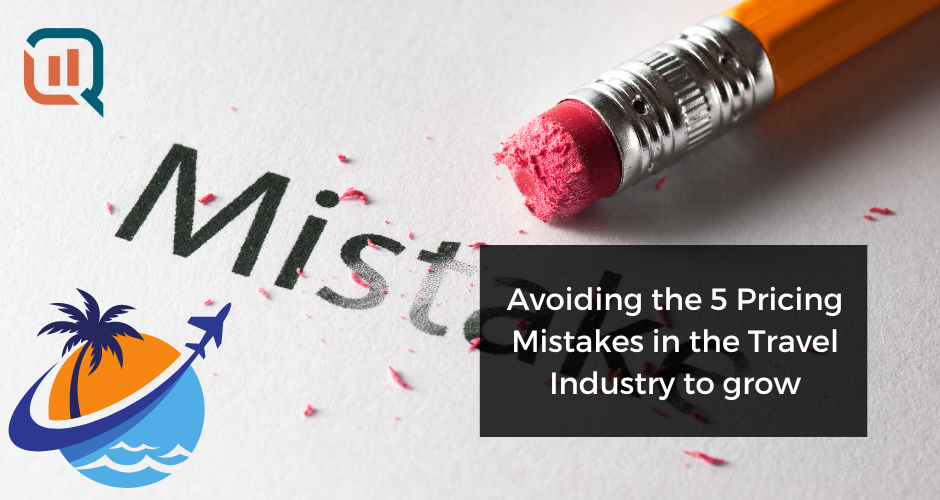The travel sector is characterized by fierce competition, making a well-defined pricing strategy indispensable for any business. To create successful pricing strategies, price managers must rely on accurate data and insights. Read on to learn about the top five reasons a pricing strategy is crucial in the travel sector:
- Gain a Competitive Advantage: In the highly competitive tourism industry, differentiation is key. A solid pricing strategy allows companies to distinguish themselves from competitors. By utilizing technologies like pricing intelligence software and price trackers, businesses can monitor their competitors’ prices and adjust their own accordingly. This provides a significant advantage in the competitive market.
- Prioritize Revenue Maximization: Maximizing revenue is a priority for any business. However, there is no one-size-fits-all method for achieving this goal. A smart starting point is analyzing current revenue sources and identifying areas for improvement. This could involve expanding the range of goods or services offered, strengthening pricing approaches, or enhancing marketing initiatives. Additionally, investing in sales and customer service training ensures that staff are prepared to increase revenue from existing clients. Ultimately, revenue maximization requires a blend of strategic planning, continuous analysis and improvement, and a commitment to delivering excellent customer experiences.
- Improve Customer Loyalty: Effective pricing strategies that provide the greatest value for customers’ needs can cultivate customer loyalty. Tailored discounts and competitive pricing initiatives aligned with each customer’s preferences establish lasting partnerships with clients.
- Avoid Common Pricing Mistakes: Avoiding common pricing mistakes is crucial for ensuring business success. Factors such as competition, product differentiation, and target market should be carefully considered. Underpricing products or services, for example, may create the perception of low quality, which should be avoided.
- Adapt to Market Changes: Adapting business strategies to respond to market changes is essential for long-term success. By closely monitoring the market and adjusting their strategies accordingly, companies can stay ahead of the competition and maintain a strong position in their industry. Remaining flexible and open-minded is crucial, as new trends and developments can emerge at any time.
Pricing strategy plays a pivotal role in the success of companies in the travel industry. Price trackers and pricing intelligence software are valuable tools that pricing managers can leverage to gain a competitive edge, drive revenue, improve customer loyalty, avoid common pricing errors, and adapt to market changes. Crafting an effective pricing strategy is essential for positioning a company for success in this fiercely competitive industry.
Top 5 Mistakes in Pricing Strategies for the Travel Industry and How to Avoid Them
In this section, we will explore the top 5 pricing mistakes commonly made by travel companies and provide actionable solutions to help pricing managers avoid these pitfalls. By implementing these strategies, travel companies can optimize their pricing and increase revenue.
1. Overreliance on Cost-Based Pricing
Relying too heavily on cost-based pricing is a significant mistake. Pricing products based solely on production costs can result in products being overvalued or underpriced, negatively impacting revenue.
Solution:
To avoid this error, companies should adopt a value-based pricing strategy. This strategy aims to maximize revenue by aligning prices with customer expectations and the perceived value of the product or service.
2. Ignoring Customer Behavior
Neglecting to consider customer behavior and preferences is another common pricing error. This may lead to unattractive prices or a lack of desired pricing options for customers.
Solution:
Businesses should leverage price monitoring and pricing intelligence tools to gather data on consumer behavior and preferences. This data enables pricing managers to make well-informed pricing decisions that align with customer requests and expectations.
3. Incorrect Price Setting
Setting prices too high or too low is a frequent pricing mistake in the travel industry.
Solution:
To avoid this, companies should conduct thorough market research and competitor analysis. This helps identify market demand and pricing strategies employed by competitors, allowing companies to set competitive prices that align with market expectations.
4. Lack of Pricing Options
Failing to offer diverse pricing options limits revenue opportunities.
Solution:
To overcome this mistake, companies should implement dynamic pricing and bundling strategies. These strategies involve providing flexible pricing options, such as variable pricing based on time or demand, or bundling products and services together at a discounted price, catering to a wider range of customers.
5. Failure to Adjust Pricing Strategies Over Time
Not adapting pricing strategies over time is a common mistake made by travel companies. This can result in missed revenue opportunities and an inability to adapt to changing market demands and competition.
Solution:
To avoid this mistake, companies should continuously monitor and adjust their pricing strategies using pricing intelligence tools like Opti Price by QL2, which helps track competitors’ pricing strategies and analyze the results of pricing methods. By tracking customer behavior and preferences, companies can make informed decisions that maximize revenue and maintain competitiveness.
In Conclusion
Travel companies can optimize their pricing strategies and increase revenue by avoiding these common pricing mistakes and implementing the solutions discussed above. By crafting effective pricing strategies, leveraging pricing intelligence tools, pricing trackers, conducting market research with tools like Data Scout by QL2, and continuously monitoring and adjusting pricing strategies, companies can make informed decisions that align with customer needs and expectations, positioning themselves for success in the travel industry.
Contact us to learn more and get started.
